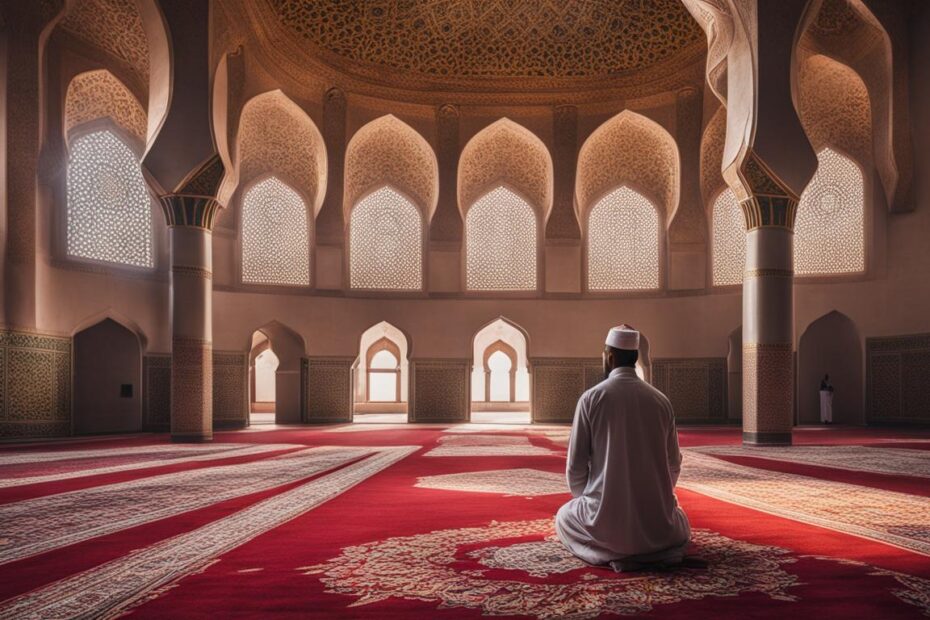In this article, we will explore the profound journey into the prayer practices of Islam. We will delve into the roots, rituals, and significance of prayer in the Islamic faith. Through an in-depth examination of sources, we will gain a comprehensive understanding of how Muslims perform their prayers and the importance of prayer in their daily lives.
Key Takeaways
- Prayer practices of Islam are deeply rooted in the religious and spiritual beliefs of Muslims.
- Muslims perform daily prayers, known as salah, which involve specific movements and postures.
- Prayer is a means of communication with Allah and serves as a source of spiritual nourishment for Muslims.
- Understanding the significance of prayer in Islam provides valuable insights into the beliefs and values of Muslims.
- Prayer fosters a sense of community and unity within the Muslim faith.
The Essence and Significance of Jumah Prayer in Islam
Jumah, also known as the congregational Friday prayer, is a cornerstone of Islamic practice. It holds deep spiritual significance and brings together Muslim communities for collective worship and reflection. Jumah serves as a powerful reminder of the importance of community in Islam, fostering unity and strengthening the bonds between individuals and their faith.
“The congregational prayer is twenty-seven times more superior than the prayer offered by a person alone,” said Prophet Muhammad (peace be upon him), emphasizing the significance of coming together for Jumah prayer.
“When the day of Jumah comes, the angels stand at the gate of the mosque and write down who comes first, and then who comes next. When the Imam sits down, the records are closed and they come to listen to the reminder (khutbah).”
“Whoever takes a bath on Friday, purifies himself as much as he can, then uses his (hair) oil or perfumes himself with the scent of his house, then proceeds (for the Jumu’ah prayer) and does not separate two people sitting together (in the masjid), then prays as much as (Allah has) written for him and remains silent while the Imam is delivering the Khutba, his sins in-between the present and the last Friday will be forgiven.”
The Jumah prayer consists of several components, including a sermon (khutbah) delivered by the Imam, followed by a congregational prayer. Muslims gather in the mosque to listen to the khutbah, which provides guidance, knowledge, and reminders of Islamic teachings. The sermon is a time for reflection, learning, and seeking wisdom from the Imam.
The congregational prayer that follows the khutbah is a unique experience, as Muslims pray together, shoulder to shoulder, standing in unity before Allah. This collective act of worship reinforces the sense of community and solidarity among Muslims, reminding believers of their shared faith and values. Attending Jumah prayer not only fulfills a religious obligation but also offers spiritual nourishment and blessings.
Table: The Components of Jumah Prayer
| Components | Description |
|---|---|
| Preparation | Performing ablution (wudu) and dressing in clean and modest attire. |
| Khutbah | A sermon delivered by the Imam, providing guidance and reminders of Islamic teachings. |
| Congregational Prayer | Muslims pray together, following the Imam, standing shoulder to shoulder. |
Jumah prayer has a global impact, bringing Muslims of different backgrounds, cultures, and languages together in worship. It serves as a unifying force, transcending geographical boundaries and fostering a sense of brotherhood and sisterhood in the Muslim community worldwide.
Next, we will explore the rituals and significance of daily prayers in Islam, highlighting the importance of salah in the lives of Muslims.
The Rituals and Significance of Daily Prayers in Islam
In the Islamic faith, daily prayers, also known as salah, hold immense significance. These prayers are a fundamental aspect of Muslim worship and serve as a means of seeking closeness to Allah. Understanding the rituals and practices associated with daily prayers provides valuable insights into the beliefs and values of Muslims.
The five daily prayers in Islam are Fajr, Dhuhr, Asr, Maghrib, and Isha. Each prayer has its designated time and specific movements that Muslims perform while facing the Kaaba in Mecca. These movements include standing, bowing (rukoo), prostration (sujood), and sitting. The physical postures adopted during prayer symbolize humility, submission, and devotion to Allah.
Engaging in daily prayers not only strengthens the bond between the individual and Allah but also brings numerous spiritual and personal benefits. Regular prayer helps Muslims attain spiritual purification, seek guidance, and find solace in moments of difficulty. It serves as a reminder of one’s purpose in life and encourages mindfulness and gratitude.
| Prayer | Time | Movements |
|---|---|---|
| Fajr | Pre-dawn | Standing, bowing, prostration |
| Dhuhr | Midday | Standing, bowing, prostration |
| Asr | Afternoon | Standing, bowing, prostration |
| Maghrib | After sunset | Standing, bowing, prostration |
| Isha | Evening | Standing, bowing, prostration |
By performing daily prayers, Muslims establish a deep connection with Allah and reinforce their faith. The consistent practice of salah cultivates discipline, devotion, and a sense of spiritual responsibility. It also serves as a unifying factor for the global Muslim community, as Muslims around the world engage in the same prayers at designated times, regardless of their geographical location.
The rituals and significance of daily prayers in Islam highlight the central role of prayer in the lives of Muslims. It is through prayer that Muslims express their devotion, seek forgiveness, and find inner peace. Understanding the importance of daily prayers provides a glimpse into the profound spiritual journey that Muslims embark upon in their quest for spiritual growth and closeness to Allah.
Balancing Work and Worship: Navigating Jumah in Western Countries
Muslims living in non-Muslim-majority countries often face unique challenges in upholding their religious practices, especially when it comes to attending Friday prayers (Jumah). Adapting Jumah culturally to the Western context requires finding a delicate balance between work and worship.
In non-Muslim-majority countries, Muslims have to navigate the demands of their professional lives while ensuring they can fulfill their religious obligations. This often involves seeking provisions from employers and educational institutions to accommodate the need for time off during Friday afternoons, as Jumah is an important congregational prayer that Muslims strive to attend. Some workplaces have embraced diversity and inclusion initiatives, recognizing the significance of religious observances and making accommodations for Muslim employees to observe Jumah.
Additionally, Muslims in Western countries often face the challenge of finding appropriate places to pray. With limited access to mosques, they may need to adapt and make use of alternative spaces such as prayer rooms, designated areas in universities or workplaces, or even their own homes. These adaptations demonstrate the resilience and commitment of Muslims in upholding their faith while living in non-Muslim-majority environments.
Navigating Jumah in Non-Muslim-Majority Countries: Key Considerations
- Workplace Accommodations: Many employers recognize the importance of religious diversity and are willing to accommodate employees’ religious practices. Seeking provisions for time off during Friday afternoons or flexible working hours can enable Muslims to observe Jumah without hindrance. Open communication with employers and HR departments is essential in negotiating these accommodations.
- Utilizing Prayer Spaces: When access to mosques is limited, Muslims can utilize prayer rooms in universities, workplaces, or community centers. These designated spaces provide a quiet and conducive environment for prayer. It is important to familiarize oneself with the available prayer facilities and their schedules to ensure timely observance of Jumah.
- Organizing Community Jumah: In some cases, Muslim communities organize Jumah prayers in non-traditional settings, such as rented event spaces or community centers. This allows for a larger gathering of worshippers and fosters a sense of community. Such initiatives are vital in providing opportunities for Muslims to come together and worship, particularly in areas where access to mosques is limited.
Adapting Jumah Culturally: Challenges and Solutions
Adapting Jumah culturally in Western countries requires Muslims to navigate cultural norms and practices while upholding the religious significance of the congregational prayer. Some challenges may include language barriers, different work schedules, or cultural differences in understanding the importance of Jumah. However, Muslims have found innovative solutions to overcome these challenges, such as:
“Jumah Lunch” initiatives in workplaces, where employees gather during lunch breaks to perform Jumah prayers together. This allows for flexibility in work schedules and fosters a sense of community among Muslim colleagues.”
In conclusion, navigating Jumah in non-Muslim-majority countries requires adaptability and determination from Muslims. By seeking accommodations, utilizing alternative prayer spaces, and organizing community Jumah prayers, Muslims can strike a balance between work and worship. Adapting Jumah culturally ensures that the spiritual significance of this congregational prayer is preserved, allowing Muslims in Western countries to uphold their religious practices while contributing to the diverse fabric of society.
Conclusion
Prayer is a fundamental aspect of Islamic practice, serving as a means of communication with Allah and a source of spiritual nourishment for Muslims. It is an essential part of the Muslim identity and fosters a sense of community and unity within the faith.
Understanding the prayer practices of Islam provides valuable insights into the beliefs and values of Muslims and highlights the significance of prayer in their lives. Through prayer, Muslims seek guidance, find solace, and strengthen their connection with Allah, ultimately leading to personal growth and spiritual fulfillment.
The importance of prayer in Islam cannot be overstated. It is a daily reminder of the individual’s reliance on Allah and their commitment to the teachings of Islam. Prayer offers a sanctuary in the midst of life’s challenges and an opportunity for reflection and gratitude. It is through prayer that Muslims find peace and find the strength to navigate the complexities of the modern world.
Moreover, the benefits of prayer in Islam extend beyond the individual. It fosters a sense of community and unity, bringing Muslims together in worship and shared devotion. Prayer serves as a reminder of the interconnectedness of believers, transcending cultural and geographical boundaries. It is a unifying force that strengthens the bonds of brotherhood and sisterhood within the Muslim community.
FAQ
What is the significance of prayer in Islam?
Prayer is a fundamental aspect of Islamic practice, serving as a means of communication with Allah and a source of spiritual nourishment for Muslims. It fosters a sense of community and unity within the faith and leads to personal growth and spiritual fulfillment.
What is Jumah prayer and why is it important?
Jumah, or the congregational Friday prayer, holds deep spiritual significance in Islam. It brings communities together for worship and reflection, fostering unity among Muslims. Attending Jumah prayer is considered a special blessing and an essential part of Islamic practice.
What are the components of Jumah prayer?
Jumah prayer consists of preparation, a sermon (khutbah), and congregational prayer. Muslims gather in mosques to listen to the sermon, which is followed by a congregational prayer. It is an important communal act of worship, enhancing the spiritual experience of the Muslim community.
How are daily prayers performed in Islam?
Daily prayers, known as salah, involve specific movements and postures. Muslims perform five daily prayers, strengthening their bond with Allah and seeking guidance and solace. These prayers are an integral part of Muslim worship and devotion.
How do Muslims in non-Muslim-majority countries balance work and worship?
Muslims in Western countries often face challenges in upholding their religious practices. They strive to find a balance between work and worship, seeking accommodations from employers and educational institutions to attend Friday prayers (Jumah). They also adapt to praying in non-Muslim-majority environments, finding appropriate places to fulfill their religious obligations.









